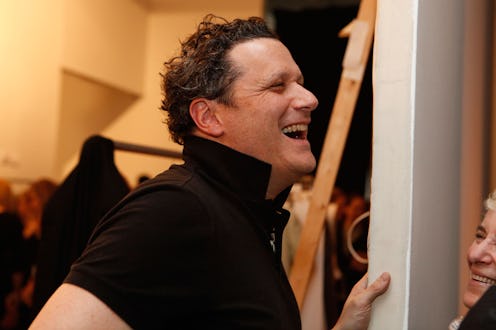Isaac Mizrahi loves dressing women, and always has. The fashion designer, former Project Runway: All Stars judge, and all-around industry mogul isn't a newbie on the fashion scene, and has seen the good, the bad, and the ugly when it comes to size inclusivity in the fashion world (or the lack thereof). Now, at a time when terms like "plus size" and "straight size" are being thrown around constantly, it's hard to tell just how far the industry has come, and how far it has to go. "Absolutely, there’s a long road ahead," Mizrahi tells me over email. "I wish the plus-size issue was integrated properly—which [it's] so not."
Mizrahi admits that the industry has come a long way, but he also knows that there's much more progress to be made, and he's trying to do that with his current designs — even if his early collections weren't quite as size inclusive. "The runway shows of my early career really focused on catering to what was expected for a designer on the rise back then – which was beautiful clothing for straight size women, Mizrahi says. "However, I absolutely knew my goal as a designer was to create garments for all women to feel beautiful and wonderful and confident in those clothes." Hence Mizrahi's move toward more inclusive size ranges.
Mizrahi emphasizes that it's especially important that the industry continues to move in the right direction in terms of including women of all sizes. The designer says that, although there's been progress in the industry, the next step is getting rid of labels that create division.
"I think it starts with moving away from using the words 'plus-size,'" Mizrahi says. "It’s basically like saying, 'you’re not included.'" And he isn't kidding himself about the realities of the fashion world, either. "Unfortunately, the nature of the industry is the exclusivity, which is something I really don’t like."
Within the plus-size community itself, the feelings about getting rid of the term "plus size" are decidedly mixed. In fact, many people would prefer to keep the label around. While Mizrahi's point that plus-size emphasizes a feeling of "other-ness" is one that is supported by many people, and championed by high-profile celebrities like model Ashley Graham, it isn't indicative of every person's point of view to say the least. On the opposite side of the issue is also the school of thought that refusing to use the label simply acknowledges it as being indicative of a negative or shameful characteristic.
Whichever side of the issue you stand on, you're more likely to agree with Mizrahi's belief that women of every size should have the chance to feel as confident and fabulous as possible. And although Mizrahi says a common industry excuse for not expanding size ranges is that "there's not a market for it," he knows that's far from the truth. Mizrahi's line for QVC is made for sizes from XS to 3X, which, although doesn't encompass every size in existence, is certainly a departure from brands that stop and XL or 1X.
According to Mizrahi, his QVC line is part of his ultimate goal for size inclusivity. The designer wants to continue to dress women and "make them look and feel fabulous," and Mizrahi sees no reason why that shouldn't be possible.
"I always say, I would never speak to a plus size woman differently than another woman. So why would I treat her differently in my design process?" Mizrahi asks. "I think the fashion industry needs to share that point of view, and I’m happy that things are changing."
